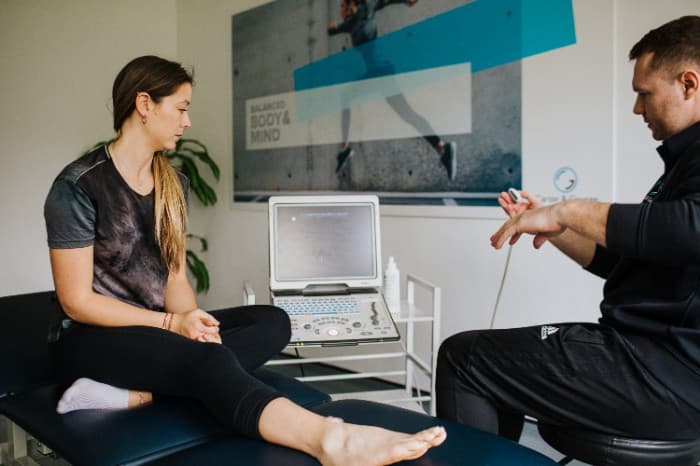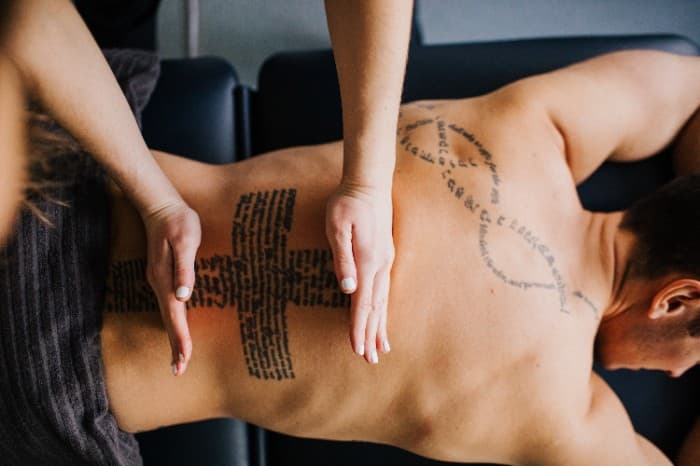Related Posts
Shockwave Therapy in Hampstead & Golders Green (NW11): What It Treats & When You Need It
Fast, effective shockwave therapy in Hampstead & Golders Green (NW11) for tendon pain, plantar fasciitis, and stubborn sports injuries. Book online today.
Discover Arthrosamid®: A New Approach to Knee Osteoarthritis Relief
Knee pain from osteoarthritis can be life-limiting - but there's a new treatment that’s changing the game. Arthrosamid® is a unique, non-surgical solution that helps reduce joint pain, improve mobility, and support long-term knee health.
Expanding Our Specialist Knee Bracing Service Across All Carter & George Clinics
At Carter & George, we are always striving to enhance the quality of care we provide to our patients. For the past three years, we have been working closely with Enovis, delivering specialist knee brace fittings across a number of our practices. We are now excited to announce that this service is expanding to all Carter & George practices.
What is a Sports Physiotherapist?

What is a Sports Physiotherapist or Sports Therapist?
A sports physiotherapist is a medical professional who specializes in the prevention, diagnosis and treatment of musculoskeletal injuries. They use physical techniques such as massage, heat/cold therapy, electrotherapy, dry needling, exercise programs and instructions on stretching/strengthening to help patients recover from sports-related injuries. In addition to aiding in recovery, they also give advice on how to prevent injury in the first place and get back to ‘pain free’ as fast as possible.
What does a Sports Therapist do?
Working with a sports physiotherapist can provide many benefits. By utilizing physical therapy techniques, they can help reduce pain and discomfort caused by an injury or chronic condition. They are also able to help athletes prevent injuries by providing advice on proper stretching/strengthening exercises as well as protective equipment that should be worn while playing their respective sport.
 What type of Injuries do Sports Physios Treat?
What type of Injuries do Sports Physios Treat?
Sports physiotherapists commonly treat a variety of musculoskeletal injuries, such as muscle strains, ligament sprains, tendonitis, dislocations and fractures. In addition to these types of injuries, they can provide care for chronic conditions such as arthritis and bursitis. They are also able to address issues related to posture, flexibility, strength, balance and coordination. By utilizing an individualized approach with their patients, they strive to achieve the best possible results in the shortest amount of time.
Tendon Injuries
Sports physiotherapists commonly treat tendon injuries including tendinitis, tendinosis and tendon ruptures. Tendinitis is an inflammation of a tendon due to overuse or repetitive motions, while tendinosis is the weakening of a tendon due to age or degenerative conditions. Tendon rupture is a tear in one or more of the tendons that can occur due to an acute injury. Tendon injuries make up a significant proportion of issues we see, including rotator cuff injury (shoulder pain), tennis elbow (elbow pain) and plantar fasciitis (heel pain).
Common Ligament Injuries
Knee Ligament Injuries
An ACL (anterior cruciate ligament) injury is one of the most common sports-related injuries that sports physiotherapists treat. ACL injuries typically occur when an athlete makes a sudden change in direction or stops abruptly, resulting in excessive strain to the knee joint. Symptoms may include pain and swelling, as well as instability of the knee.
 Ankle Ligament Injuries
Ankle Ligament Injuries
Ankle ligament injuries are another common type of sports-related injury that sports physiotherapists treat. Symptoms may include pain, swelling and instability in the ankle joint. This can be caused by either an acute injury or overuse due to repetitive motions.
Muscle strains and tears
Muscle strains are another type of injury that sports physiotherapists commonly treat. A muscle strain occurs when the fibers within the muscle are stretched beyond their normal limits, resulting in pain and discomfort. Muscle tears are a common running injury.
 Common areas where a strain can occur include the hamstring, quadriceps, hip flexors and glutes. Symptoms may include sudden onset of pain, swelling and bruising. Physiotherapy treatment typically includes rest, ice/heat therapy, exercises to improve flexibility and strength, as well as manual therapy techniques such as massage or dry needling to help reduce discomfort. Sports physiotherapists play an important role in the rehabilitation of muscle strains by providing advice on how to prevent re-injury once the individual has recovered.
Common areas where a strain can occur include the hamstring, quadriceps, hip flexors and glutes. Symptoms may include sudden onset of pain, swelling and bruising. Physiotherapy treatment typically includes rest, ice/heat therapy, exercises to improve flexibility and strength, as well as manual therapy techniques such as massage or dry needling to help reduce discomfort. Sports physiotherapists play an important role in the rehabilitation of muscle strains by providing advice on how to prevent re-injury once the individual has recovered.
Neck and Lower Back Pain
Neck pain and lower back pain are two common injuries that sports physiotherapists often treat. Neck pain can be caused by an acute injury, poor posture or a condition such as arthritis. Symptoms may include stiffness, tenderness and radiating discomfort into the arms or shoulders.
 Lower back pain can be caused by an acute injury or chronic condition such as a disc herniation or spinal stenosis. Symptoms may include stiffness, radiating discomfort into the legs, numbness or tingling in the legs/feet.
Lower back pain can be caused by an acute injury or chronic condition such as a disc herniation or spinal stenosis. Symptoms may include stiffness, radiating discomfort into the legs, numbness or tingling in the legs/feet.
Treatment for both typically includes manual therapy techniques such as massage or dry needling to help reduce discomfort, as well as exercises that focus on strengthening and flexibility.
Treatment from a Sports Physio
You may be asking – ‘What do Sports Therapists do?’ . Here are some of the most common treatments they offer.
Manual therapy and Sports Massage
Manual therapy is a type of physical therapy that focuses on the manipulation of soft tissues and joints to improve pain, range of motion and function. It can be used to treat both acute and chronic conditions related to sports injuries.
Sports massage is one type of manual therapy commonly used by sports physiotherapists to treat sports injuries. It involves the application of pressure, deep tissue massage and stretching to help reduce pain, tension and inflammation in the affected area. Benefits of sports massage include increased blood flow and range of motion, improved flexibility, decreased muscle spasm and improved healing time for injured muscles and tendons.
 Shockwave therapy
Shockwave therapy
Shockwave therapy is a non-invasive, drug-free treatment that is used to treat chronic pain caused by muscle and tendon injuries. This type of therapy uses sound waves to stimulate the body’s healing process and improve circulation in the affected area. It is mainly used to treat sports injury and tendon injuries such as tennis elbow, Achilles pain, heel pain (plantar fasciitis) and rotator cuff pain.
 Dry needling
Dry needling
Dry needling is another type of treatment commonly used by sports physiotherapists to treat sports injuries. It is often compared to acupuncture treatment, but is more based on anatomy and physiology than meridian theory. Dry needling involves the insertion of acupuncture needles into areas of muscle tissue in order to alleviate pain and improve range of motion. It is believed that this helps to release tight, contracted muscles which can lead to improved mobility, strength and reduced pain.
 Exercise Therapy and Strength & Conditioning
Exercise Therapy and Strength & Conditioning
Exercise therapy is another important part of treatment for sports injuries. It involves the use of specific exercises to help improve strength, flexibility and range of motion. Exercise therapy may also involve the use of specialized equipment such as weights or resistance bands in order to increase the effectiveness of the treatment.
 Prevention: Injury Screening
Prevention: Injury Screening
Sports physiotherapists also play an important role in helping to prevent sports injury from occurring. At our clinic, we offer an injury screening service which is designed to identify any areas of muscle imbalance or weaknesses that may put you at risk for an injury.
This service involves a comprehensive physical assessment as well as a review of your medical/injury history in order to identify any potential issues that could predispose you to injury.
We also provide advice on how best to prepare for physical activity, as well as how to modify your training program in order to reduce the risk of injury. By taking a proactive approach to prevention, we can help you stay healthy and active for longer.
 Hitchin: Sports Physiotherapist
Hitchin: Sports Physiotherapist
The Carter & George Hitchin physio clinic offers state-of-the-art sports physiotherapy services for local athletes and active individuals. Our team of experienced physiotherapists specialize in the full assessment, treatment and prevention of sports injury incurred during sport or other physical activities. We proudly offer a holistic approach to treatment, considering the whole body.
We offer a comprehensive range of treatments, including manual therapy, dry needling, sports massage, exercise-based rehabilitation, metabolic testing, running analysis and injury screening. We also provide advice on how best to prepare for physical activity, as well as how to modify your training program in order to reduce the risk of injury and relieve pain.
 Our Hitchin clinic is now open!
Our Hitchin clinic is now open!
If you are an athlete or active individual living in Hitchin (Hertfordshire) who is looking for expert care from a qualified sports physiotherapist, please contact us at the clinic to make an appointment today.